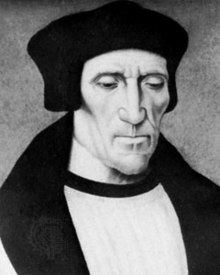Richard Foxe
| Richard Foxe | |
|---|---|
| Bishop of Winchester | |
 |
|
| Church | Catholic |
| Appointed | August 1501 |
| Term ended | 5 October 1528 |
| Predecessor | Thomas Langton |
| Successor | Thomas Wolsey |
| Orders | |
| Consecration | 8 April 1487 |
| Personal details | |
| Born |
c. 1448 Ropsley, Lincolnshire |
| Died | 5 October 1528 |
| Previous post |
Bishop of Exeter Bishop of Bath and Wells Bishop of Durham |
Richard Foxe (sometimes Richard Fox) (c. 1448 – 5 October 1528) was an English churchman, successively Bishop of Exeter, Bath and Wells, Durham, and Winchester, Lord Privy Seal, and founder of Corpus Christi College, Oxford.
Foxe was born at Ropsley near Grantham, Lincolnshire. His parents belonged to the yeoman class, and little is known about Foxe's early career. He is thought to have gone to Magdalen College, Oxford, from which he drew many members of his subsequent foundation, Corpus Christi. He also appears to have studied at Cambridge University, but nothing definite is known of his first thirty-five years. He was Master of the school in Stratford-upon-Avon from 1477, "a man of wisdom, knowledge, learning and truth."
In 1484, Foxe was in Paris possibly for the sake of learning or because he had made himself unpopular with Richard III. There he came into contact with Henry Tudor, who was beginning his quest for the English throne, and was taken into his service. In January 1485 Richard intervened to prevent Foxe's appointment to the vicarage of Stepney on the ground that he was keeping company with the "great rebel, Henry ap Tuddor."
The important offices conferred on Foxe immediately after the Battle of Bosworth imply that he had already seen more extensive political service than can be traced in records. His Tudor credentials immediately confirmed by ordination as Vicar of Stepney. Doubtless Henry had every reason to reward his companions in exile, and to rule like Ferdinand II of Aragon by means of lawyers and churchmen rather than trust nobles like those who had made the Wars of the Roses. But without an intimate knowledge of Foxe's political experience and capacity he would hardly have made him his principal secretary, and soon afterwards Lord Privy Seal and elected Bishop of Exeter on 29 January 1487, being consecrated on 8 April. The ecclesiastical role provided a salary that was not at Henry's expense; for Foxe never saw either Exeter or the diocese of Bath and Wells to which he was moved in February 1492. His activity was confined to political and especially diplomatic channels; during John Morton's lifetime, Foxe was his subordinate, but after the archbishop's death he was first in Henry's confidence, and had an important share in all the diplomatic work of the reign. In 1487 he negotiated a treaty with King James III of Scotland, and in 1491 he baptized the future King Henry VIII of England. In 1492 he helped conclude the Peace of Etaples, and in 1493 he was chief commissioner in the negotiations for the famous commercial agreement with the Netherlands which Bacon seems to have been the first to call the Magnus Intercursus.
...
Wikipedia
